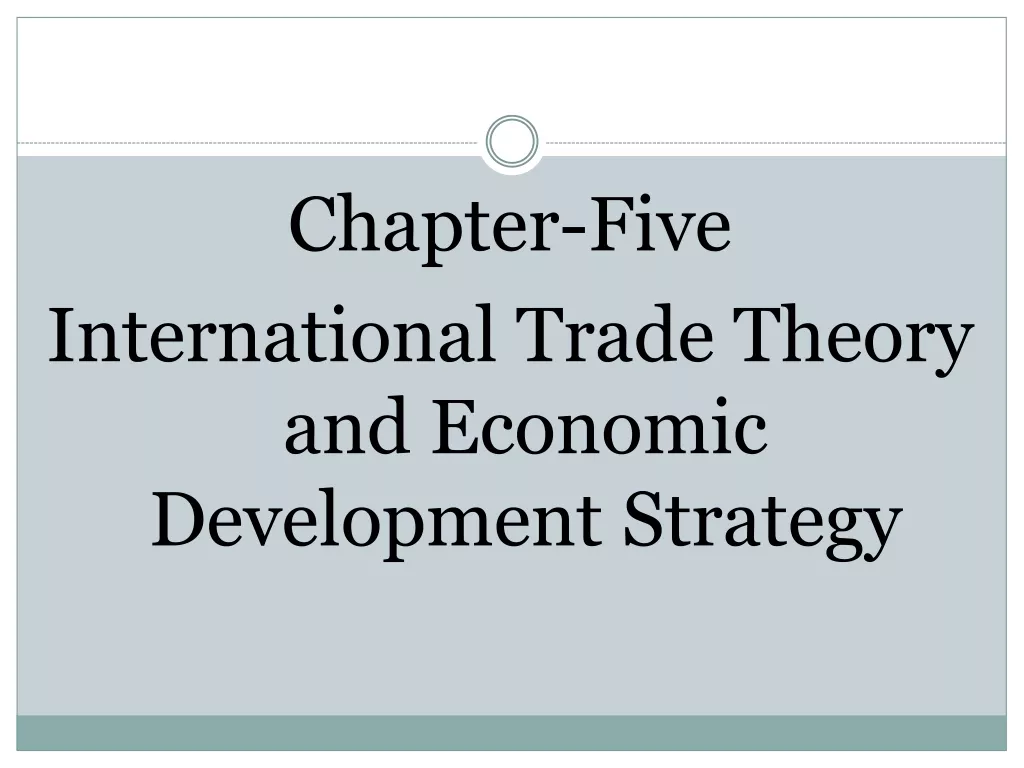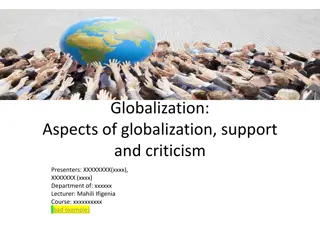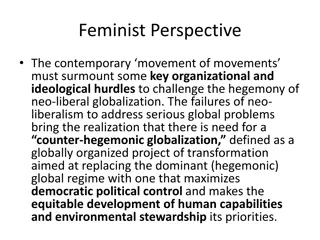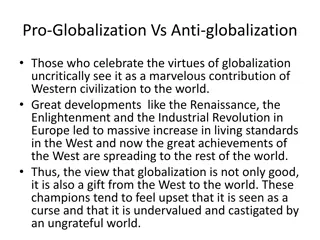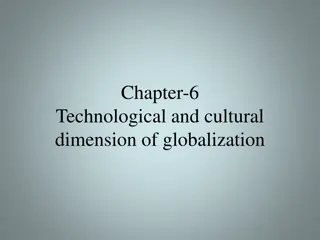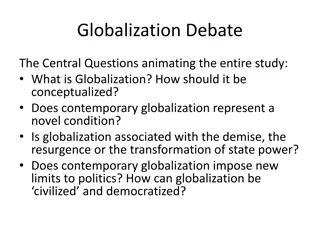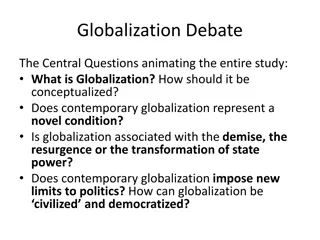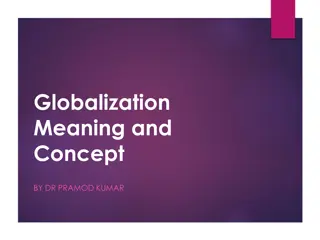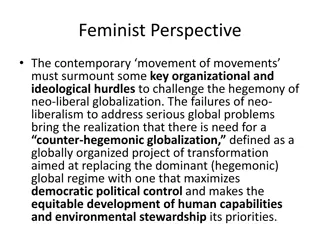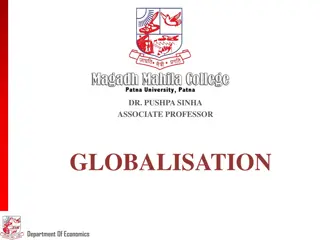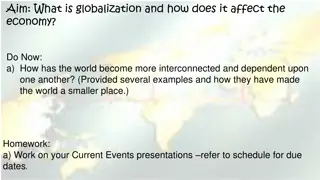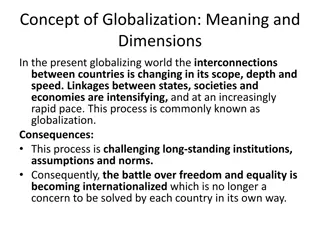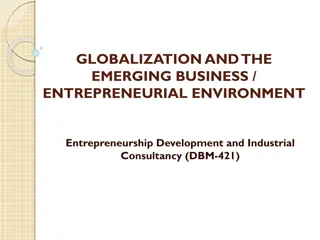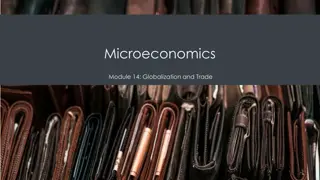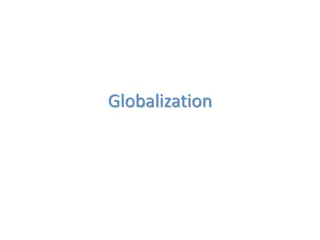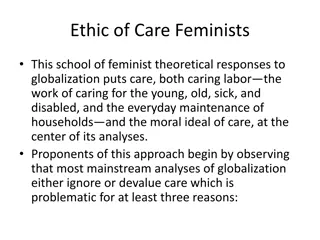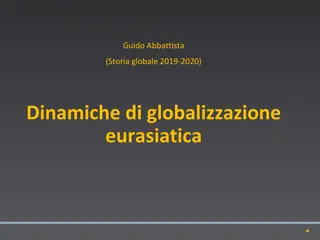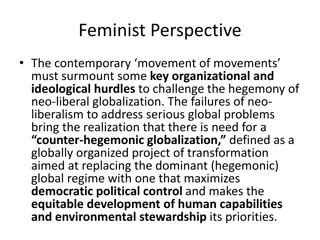Rethinking Globalization: Diverse Perspectives and Historical Insights
Globalization is a complex phenomenon with proponents celebrating Western contributions while others critique Western dominance. However, historical evidence shows globalization as a global heritage, benefiting from interactions between East and West over centuries.
Download Presentation

Please find below an Image/Link to download the presentation.
The content on the website is provided AS IS for your information and personal use only. It may not be sold, licensed, or shared on other websites without obtaining consent from the author.If you encounter any issues during the download, it is possible that the publisher has removed the file from their server.
You are allowed to download the files provided on this website for personal or commercial use, subject to the condition that they are used lawfully. All files are the property of their respective owners.
The content on the website is provided AS IS for your information and personal use only. It may not be sold, licensed, or shared on other websites without obtaining consent from the author.
E N D
Presentation Transcript
Pro-Globalization Vs Anti-globalization Those who celebrate the virtues of globalization uncritically see it as a marvelous contribution of Western civilization to the world. Great developments like the Renaissance, the Enlightenment and the Industrial Revolution in Europe led to massive increase in living standards in the West and now the great achievements of the West are spreading to the rest of the world. Thus, the view that globalization is not only good, it is also a gift from the West to the world. These champions tend to feel upset that it is seen as a curse and that it is undervalued and castigated by an ungrateful world.
Pro-Globalization Vs Anti-globalization (contd.) From the opposite perspective, Western dominance is seen as a continuation of Western imperialism. Contemporary capitalism, driven and led by greedy and grabby Western countries in Europe and North America, has established rules of trade and business relations that do not serve the interests of the poorer people in the world. The celebration of various non-Western identities- defined by religion, region or culture- can add fuel to the fire of confrontation with the West.
Globalization: Neither New Nor Necessarily Western and not a Curse. Over thousands of years, globalization has contributed to the progress of the world through travel, trade, migration, spread of cultural influences, and dissemination of knowledge and understanding. These global interrelations have often been very productive in the advancement of different countries. They have not necessarily taken the form of increased Western influence. Indeed, the active agents of globalization have often been located far from the West.
Globalization from the East to the West Around 1000 A.D., global reach of science, technology, and mathematics was changing the nature of the old world, but the dissemination then was, to a great extent, in the opposite direction of what we see today. The high technology in the world of 1000 A.D. included paper, the printing press, gunpowder, the iron-chain suspension bridge, the kite, the magnetic compass, the rotary fan, etc. These items were used extensively in China and were spread across the world, including Europe, through globalization. A similar trend is seen in the Eastern influence on Western mathematics. The decimal system emerged and became well developed in India between the second and sixth centuries. It was used by Arab mathematicians soon thereafter and these mathematical innovations reached Europe mainly in the last quarter of the tenth century playing an important part in the scientific revolution that helped to transform Europe.
Global Civilization: A World Heritage The agents of globalization are neither European nor exclusively Western, nor are they necessarily linked to Western dominance. Indeed, Europe would have been a lot poorer- economically, culturally, and scientifically- had it resisted the globalization of mathematics, science and technology at that time. The same principle applies today, though in the reverse direction (from West to East). To reject the globalization of science and technology because it represents Western influence and technology would amount to overlooking global contributions-drawn from many different parts of the world- that lie solidly behind so-called Western science and technology. It would also be quite a daft practical decision, given the extent to which the whole world can benefit from the process which is a global heritage.
Resisting Globalization of Ideas and Practices: A Misdiagnosis Opposing globalization on the plea that it represents Westernization or Western imperialism of ideas and beliefs has played quite a regressive part in the colonial and postcolonial world. This assumption incites parochial tendencies and undermines the possibility of objectivity in science and knowledge which is counter-productive in itself. Of course, there are issues related to globalization that do connect with imperialism and a postcolonial understanding of the world has its merits. But it would be a great mistake to see globalization primarily as a feature of imperialism. It is much bigger- much greater- than that.
Just Distribution of Benefits: The Main Issue The issue of the distribution of economic gains from globalization must be addressed as an extremely relevant issue. In overcoming pervasive poverty and inequality extensive economic interrelations and modern technology have been and remain influential- e.g. Europe, America, Japan, and East Asia have important lessons for all other regions. There cannot be much progress in understanding the nature of globalization today without first acknowledging the positive fruits of global economic contacts. Thus, the main issue is how to make good use of the remarkable benefits of economic intercourse and technological progress in a way that pays adequate attention to the interests of the deprived and the underdog. That is the constructive question that emerges from the so-called antiglobalization movements.
Justice and Inequality: the Principal Challenge (contd.) The troubling inequalities include disparities in affluence and also gross asymmetries in political, social, and economic opportunities and power. A crucial question concerns the sharing of the potential gains from globalization- between rich and poor countries and among different groups within a country. It is not sufficient to understand that the poor of the world need globalization as much as the rich do; it is also important to make sure that they actually get what they need which may require extensive institutional reforms.
Justice and Inequality(contd.) There is also a need for more clarity in formulating the distributional questions. It is often argued that the rich are getting richer and the poor poorer. But even though there are cases in which this has happened, by no means this is uniformly so. Much depends on the region or the group chosen and what indicators of economic prosperity are used. On the contrary, the apologists of globalization point to their belief that the poor who participate in trade and exchange are mostly getting richer. So the argument they too benefit turning the debate an empirical dispute. The central relevance of this question is not accepted by scholars like Prof Amartya Sen for whom the central question is justice.



